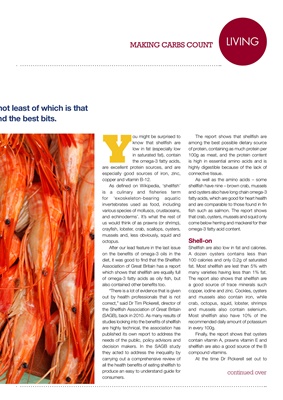
LIVING
continued over
not least of which is that
d the best bits.
You might be surprised to
know that shellfish are
low in fat (especially low
in saturated fat), contain
the omega-3 fatty acids,
are excellent protein sources, and are
especially good sources of iron, zinc,
copper and vitamin B-12.
As defined on Wikipedia, 'shellfish'
is a culinary and fisheries term
for 'exoskeleton-bearing aquatic
invertebrates used as food, including
various species of molluscs, crustaceans,
and echinoderms'. It's what the rest of
us would think of as prawns (or shrimp),
crayfish, lobster, crab, scallops, oysters,
mussels and, less obviously, squid and
octopus.
After our lead feature in the last issue
on the benefits of omega-3 oils in the
diet, it was good to find that the Shellfish
Association of Great Britain has a report
which shows that shellfish are equally full
of omega-3 fatty acids as oily fish, but
also contained other benefits too.
"There is a lot of evidence that is given
out by health professionals that is not
correct," said Dr Tim Pickerell, director of
the Shellfish Association of Great Britain
(SAGB), back in 2010. As many results of
studies looking into the benefits of shellfish
are highly technical, the association has
published its own report to address the
needs of the public, policy advisors and
decision makers. In the SAGB study
they acted to address the inequality by
carrying out a comprehensive review of
all the health benefits of eating shellfish to
produce an easy to understand guide for
consumers.
The report shows that shellfish are
among the best possible dietary source
of protein, containing as much protein per
100g as meat, and the protein content
is high in essential amino acids and is
highly digestible because of the lack of
connective tissue.
As well as the amino acids - some
shellfish have nine - brown crab, mussels
and oysters also have long chain omega-3
fatty acids, which are good for heart health
and are comparable to those found in fin
fish such as salmon. The report shows
that crab, oysters, mussels and squid only
come below herring and mackerel for their
omega-3 fatty acid content.
Shell-on
Shellfish are also low in fat and calories.
A dozen oysters contains less than
100 calories and only 0.2g of saturated
fat. Most shellfish are lest than 5% with
many varieties having less than 1% fat.
The report also shows that shellfish are
a good source of trace minerals such
copper, iodine and zinc. Cockles, oysters
and mussels also contain iron, while
crab, octopus, squid, lobster, shrimps
and mussels also contain selenium.
Most shellfish also have 10% of the
recommended daily amount of potassium
in every 100g.
Finally, the report shows that oysters
contain vitamin A, prawns vitamin E and
shellfish are also a good source of the B
compound vitamins.
At the time Dr Pickerell set out to
MAKING CARBS COUNT